Key takeaways:
- Brand loyalty is rooted in emotional connections and positive experiences, which can significantly impact consumer trust and advocacy.
- Factors such as quality customer service, alignment with personal values, and consistent product quality are crucial for fostering brand loyalty.
- Strategies like community engagement, personalized experiences, and loyalty programs effectively enhance customer loyalty and deepen emotional connections.
- Measuring brand loyalty goes beyond metrics; emotional experiences, repeat purchases, and genuine communication shape customer perceptions and loyalty.
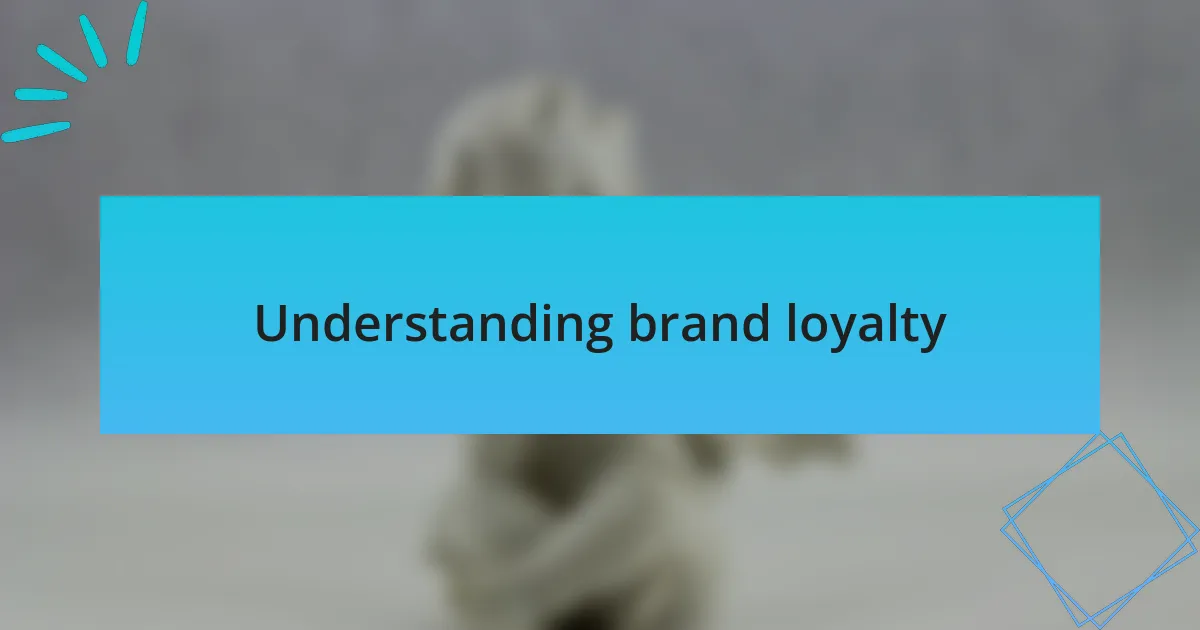
Understanding brand loyalty
Brand loyalty is more than just a habit; it’s an emotional connection between consumers and a brand. I remember a time when I became enamored with a particular coffee shop. Every morning, I would walk in, and the barista would greet me by name. That personal touch made me feel valued and appreciated, solidifying my loyalty beyond just the caffeine fix.
Have you ever felt a rush of excitement when you see your favorite brand’s logo? That’s brand loyalty in action. It’s about trust and familiarity, shaped by positive experiences that create a lasting bond. In my experience, when I purchase products from a brand I trust, it’s like wrapping myself in a warm blanket; I know I’ll get quality, and that assurance keeps me coming back.
However, I often wonder, what happens when a brand disappoints us? I faced this tough moment with a clothing brand I adored. They changed their sizing, and my go-to jeans no longer fit. That break in trust shattered my loyalty, reminding me how fragile these connections can be. It’s a powerful lesson that loyalty isn’t guaranteed; it must be nurtured through consistent quality and understanding of customer needs.
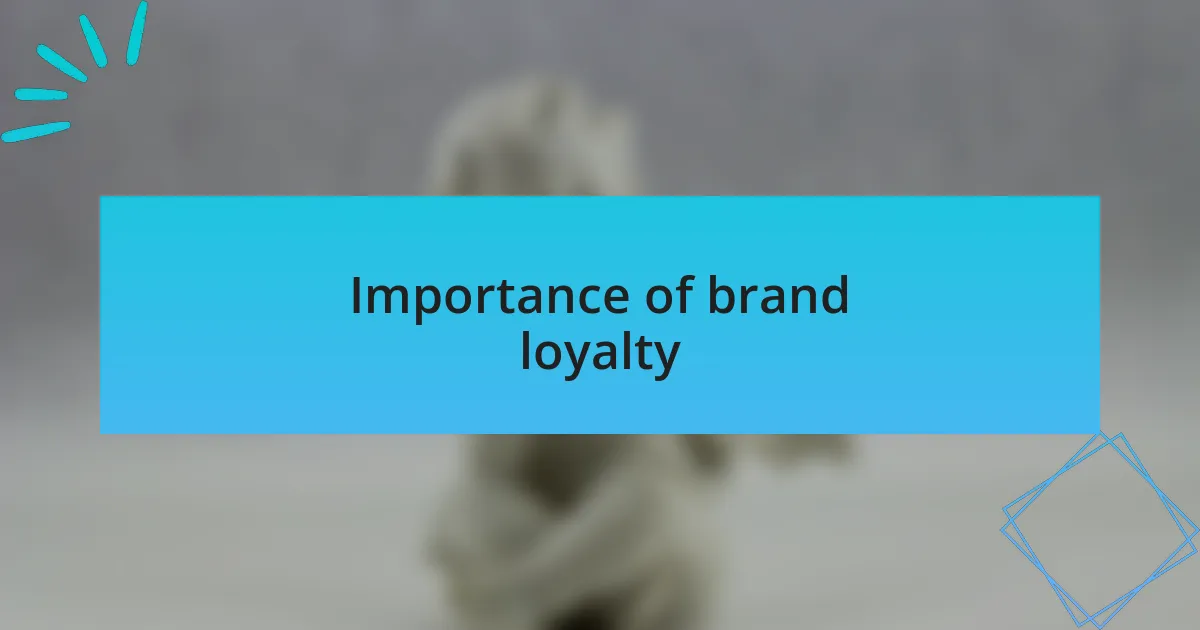
Importance of brand loyalty
The significance of brand loyalty cannot be overstated, as it often translates directly into long-term profitability. It’s fascinating how a strong connection with a brand can encourage customers to overlook minor flaws. For instance, I once stayed loyal to a tech company, even as their product updates lagged behind competitors, simply because I trusted their commitment to quality and innovation.
Moreover, loyal customers actively advocate for their favorite brands, often sharing their positive experiences with others. I’ve seen friends passionately defend a brand they love, almost like an informal ambassador. This word-of-mouth marketing is priceless; when someone I trust praises a brand, I’m more inclined to give it a shot. Don’t you find it interesting how personal recommendations can sway our buying decisions more than any advertisement?
Additionally, there’s an emotional and psychological aspect to brand loyalty that businesses must recognize. I recall the joy I felt receiving a personalized thank-you note from a brand I had purchased from consistently. This small gesture made me feel special and valued, strengthening my bond with them. It really goes to show that creating deep connections through meaningful interactions is essential for fostering brand loyalty.
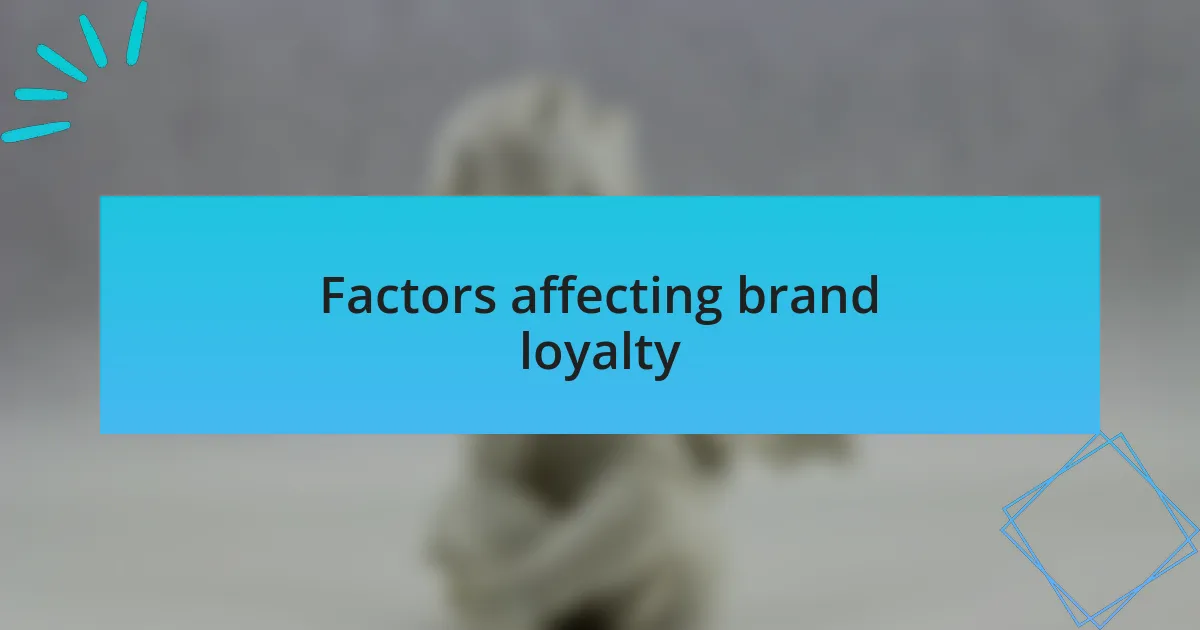
Factors affecting brand loyalty
One significant factor affecting brand loyalty is the quality of customer service. I remember a time when I reached out to a company about a product issue, and their support team responded promptly with a solution that exceeded my expectations. That experience solidified my loyalty; it made me realize how much a brand values its customers, and I would happily recommend them to others.
Another critical element is the brand’s ability to align with customers’ values and beliefs. For example, I’ve noticed that I tend to stick with brands that prioritize sustainability. When I learned that a favorite clothing brand was using eco-friendly materials, it sparked an emotional connection for me. It just felt right to support a company that cared about the planet. Does it resonate with you when a brand reflects your values?
Lastly, consistent product quality plays a pivotal role. Think about it: if you’ve relied on a specific brand for your daily needs and their quality suddenly drops, it can create doubt. I’ve shifted my preferences after encountering inconsistent quality, even from brands I once felt devoted to. Trust in a product’s reliability can easily sway our loyalty, making consistency a cornerstone of any brand’s strategy.
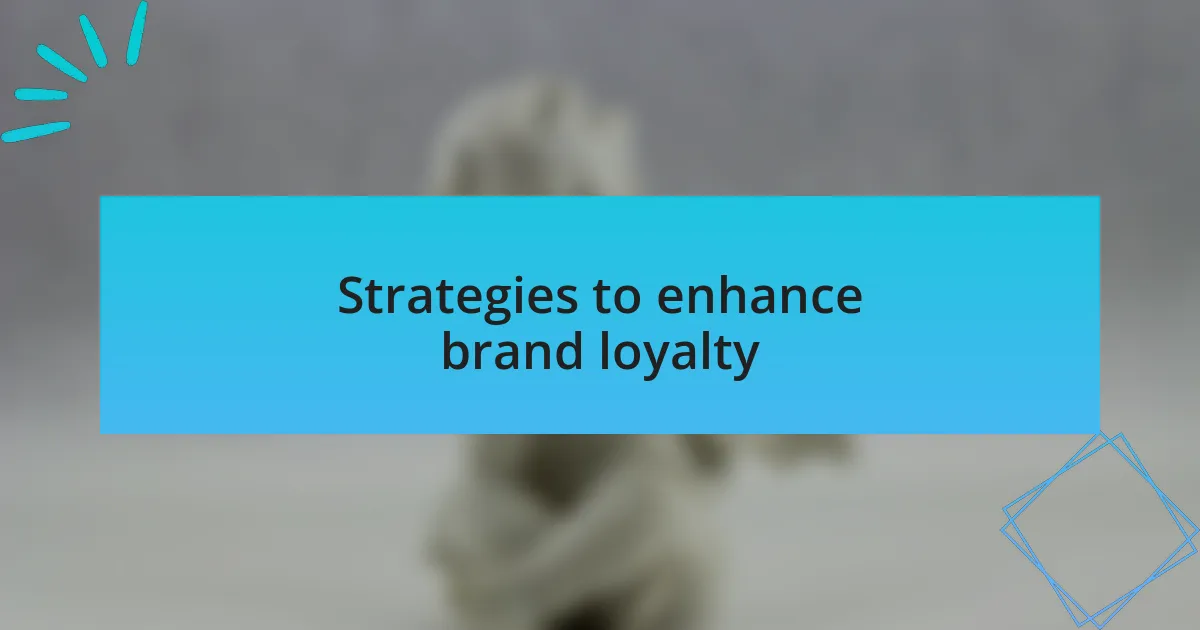
Strategies to enhance brand loyalty
One effective strategy to enhance brand loyalty is fostering community engagement. I recall participating in an online forum created by a tech brand I admire. The exchanges, sharing personal experiences and challenges with their products, made me feel like part of a larger family. It changed my perception of the brand from just a product provider to a community I genuinely wanted to support. Doesn’t it feel rewarding to be part of something bigger?
Another strategy involves personalizing customer experiences. For instance, I received a birthday discount from a favorite retailer, which felt special and tailored to me. It was more than just a discount; it showed that the brand remembered and valued me as a customer. That tailored approach deepens emotional connections and can transform casual buyers into loyal advocates. How much do you appreciate brands that make you feel seen?
Lastly, creating loyalty programs can also have a profound impact. I’ve been part of several programs where frequent purchases yield exclusive perks, and it’s always motivating. There’s something gratifying about earning rewards for my loyalty. Each time I make a purchase, I feel I’m building a relationship with the brand rather than just completing a transaction. Isn’t that a nice feeling to nurture in today’s fast-paced world?
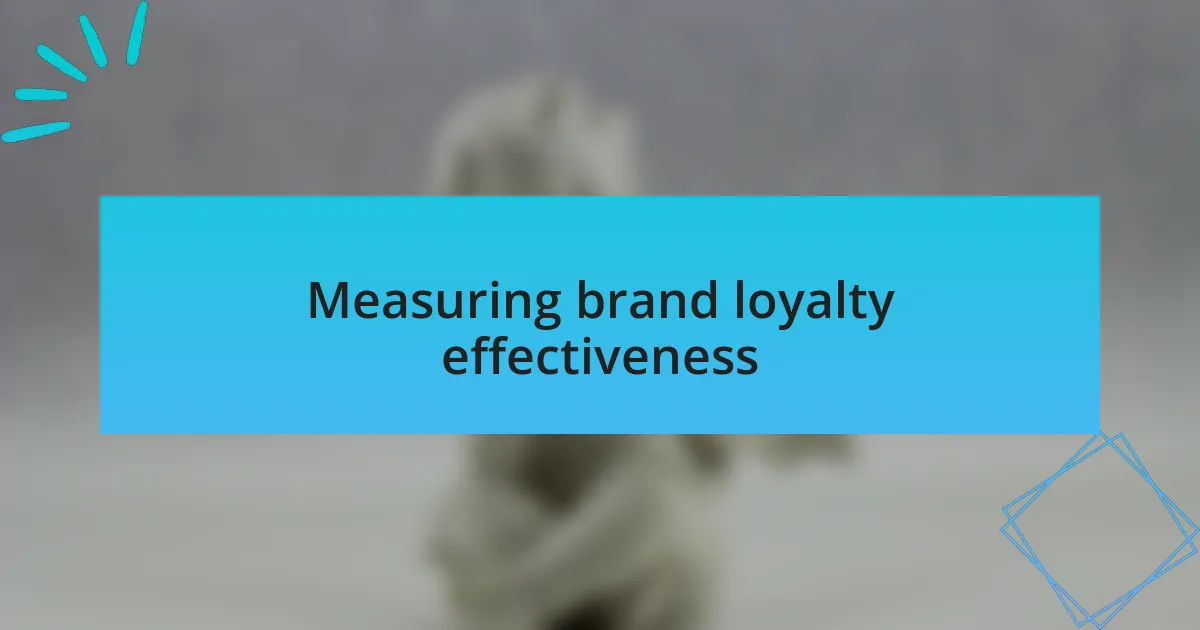
Measuring brand loyalty effectiveness
Measuring brand loyalty effectiveness often goes beyond simple metrics; it involves understanding how customers emotionally connect with a brand. I remember when I switched to a particular coffee brand after attending a tasting event they organized. The experience opened my eyes to their commitment to quality and sustainability, which resonated with my values. This particular event left me feeling more than just satisfied—it deepened my loyalty, showing me that emotional experiences can be critical indicators of brand loyalty success.
Another valuable method is analyzing repeat purchase rates. I’ve often noticed that when I trust a brand, my buying frequency increases significantly. For example, after discovering a skincare line that genuinely improved my skin, my repeat purchases surged. It’s fascinating how a positive product experience not only boosts sales but also reinforces my loyalty. This illustrates that numbers alone can’t fully capture the depth of a customer’s loyalty; the underlying emotional drivers play a crucial role as well.
Also, social listening tools can illuminate how customers perceive a brand’s authenticity. I once saw a brand boldly address a public relations issue directly on social media, and their transparency gained my respect. This willingness to engage openly transformed my view of them from just a company to a trustworthy partner. When brands listen and respond to their audience, they not only measure loyalty but also cultivate a deeper relationship with their customers. Isn’t it empowering to see brands that prioritize genuine communication?
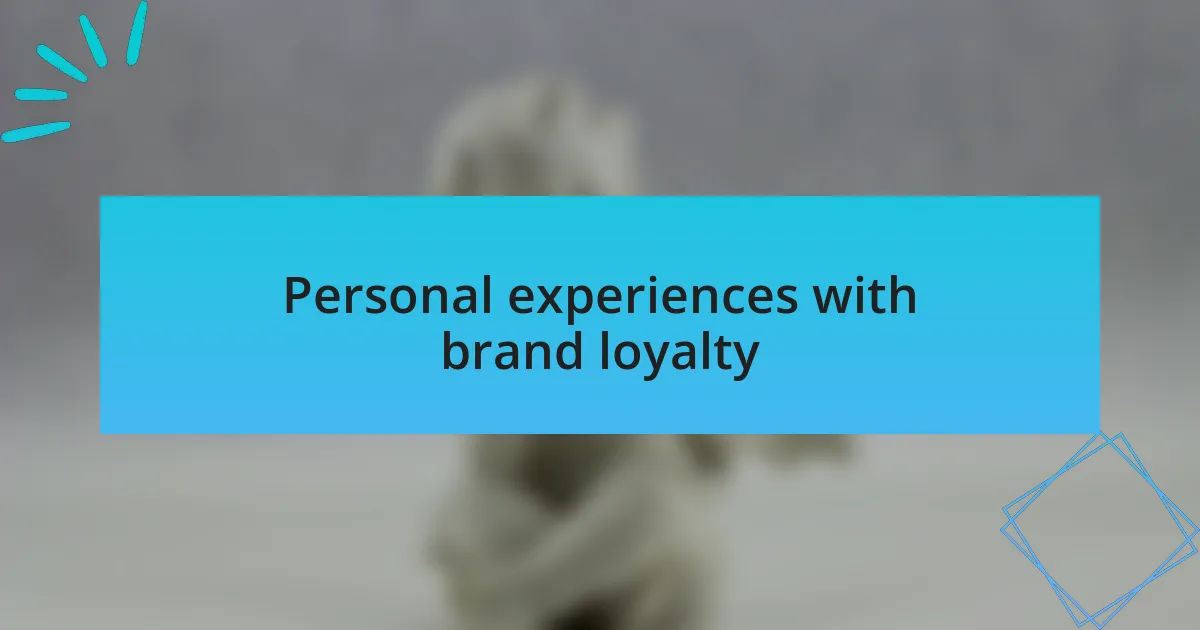
Personal experiences with brand loyalty
There was a time when I found myself gravitating toward a certain tech brand, purely because of how they handled customer service. After a minor issue with my phone, I reached out for help, expecting the usual corporate response. Instead, I was met with a friendly chat representative who took the time to listen to my concerns and went above and beyond to resolve my problem. That moment made me realize how exceptional service can create a bond that fosters loyalty, making me not only a repeat customer but also an enthusiastic advocate for their products.
On another occasion, I remember being drawn to a fashion brand due to its commitment to sustainability. When I purchased a dress from them, it wasn’t just about the item itself but the feeling that I was part of a larger movement. Every time I wore that dress, it sparked conversations with friends about ethical fashion. It’s interesting how a brand can transform a simple purchase into a badge of pride, reinforcing my loyalty through shared values. Isn’t it remarkable how personal values can intertwine with brand perception and influence our buying decisions?
Lastly, I can’t help but think of my experience with a local restaurant. Their loyalty program was nothing extraordinary; what stood out was the personal touch they offered. Whenever I dined there, the staff remembered my name and favorite dishes. This small gesture made me feel valued as a customer and turned casual visits into heartfelt connections. How powerful is it that something so simple can deepen loyalty? I often reflect on how little things can have a massive impact on my feelings toward a brand or service.
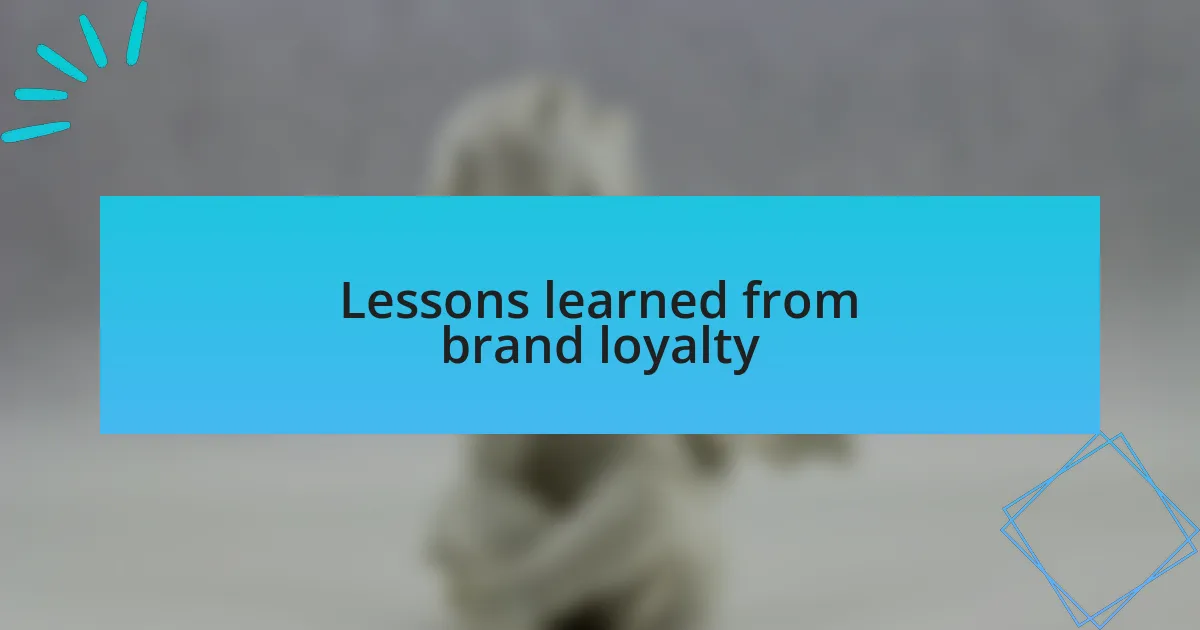
Lessons learned from brand loyalty
When considering brand loyalty, one significant lesson I’ve learned is that emotional connections are key. I had a memorable experience with a coffee brand that simply made my mornings better. It wasn’t just about the caffeine; it was the ritual of walking into my local café, where the barista would remember my order and chat about my day. This routine became a cherished part of my life, illustrating how experiences can create loyalty that goes beyond the product itself. What does this say about the role of human interaction in fostering brand allegiance?
Another eye-opening lesson revolves around the importance of authenticity. I recall discovering a skincare line that genuinely resonated with me through their transparency about ingredients. They didn’t just market their products; they shared the stories behind them. I felt informed and empowered as a consumer. This authenticity turned my initial curiosity into steadfast loyalty—a feeling I often seek in brands. Could it be that our loyalty thrives in an environment of trust and transparency?
Furthermore, I’ve realized that brand loyalty can evolve with changing values. It wasn’t long ago that I favored a popular beverage brand, but as I became aware of their environmental impact, my perspective shifted. I found myself gravitating towards companies that align with my evolving principles. This transition shows how loyalty is not static; it’s often a reflection of our personal growth. Have you noticed your own values influencing the brands you choose to support?